|
De Argentijnse schrijfster Luisa Valenzuela werd geboren op 26 november 1938 in Buenos Aires. Zie ook alle tags voor Luisa Valenzuela op dit blog.
Uit: Strange things happen here (Vertaald door Helen lane)
“In the cafe on the corner-every self-respecting cafe is on a corner, every meeting place is a crossing of two paths (two lives)-Mario and Pedro each order a cup of black coffee and put lots of sogar in it because sogar is free and provides nourishment. Mario and Pedro have been flat broke for some time-not that they're complaining, but it's time they got lucky for a change-and suddenly they see the abandoned briefcase, and just by looking at each other they tell themselves that maybe the moment has come. Right here, boys, in the cafe on the corner, no diflerent from a hundred others. The briefcase is there all by itself on a chair leaning against the table, and nobody has come back to look for it. The neighborhood boys come and go, they exchange remarks that Mario and Pedro don't listen to. There are more of them every day and they have a funny accent, they're from the interior. I wonder what they‘re doing here, why they‘ve come. Mario and Pedro wonder if someone is going to sit down at the table in the back, move the chair, and find the briefcase that they almost love, almost caress and srnell and lick and kiss. A man finally comes and sits down at the table alone (and to think that the briefcase is probably full of money, and that guy‘s going to latch onto it for the modest price of a vermonth with lernon, which is what he finally asks for after taking a little while to make up his mind). They bring him the vermouth, along with a whole bunch of appetizers. Which olive, which little piece of cheese will he be raising to his month when he spots the briefcase on the chair next to his? Pedro and Mario don't even want to think about it and yet it‘s all they can think about. When all is said and done the guy has as much or as little right to the briefcase as they do. When all is said and done it's only a question of chance, a table more carfully chosen‚ and that's it. The guy sips his drink indiffetentiy, swallowing one appetizer or another; the two of them can't even order another coffee because they're out of dough as might happen to you or to me, move perhaps to me than to you, but that‘s beside the point now that Pedro and Mario are being tyrannired by a guy who's picking bits of salami out of his teeth with his fingernail as he finishes his drink, not seeing a thing and not listening to what the boys are saying. You see them on street corners.”
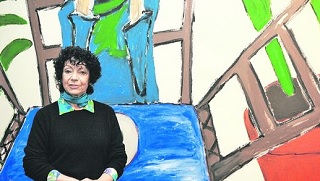
Luisa Valenzuela (Buenos Aires, 26 november 1938)
De Frans-Roemeense schrijver Eugène Ionesco werd geboren op 26 november 1912 in Slatina, Roemenië. Zie ook alle tags voor Eugène Ionesco op dit blog.
Uit: Fragments of a Journal
“Ever since I was fifteen, that is to say from that moment when I lost all that was left me of my childhood, from the moment when I ceased to be aware of the present and knew only the past hurrying into the future, that is to say into the abyss, ever since I became fully conscious of time I have felt old and I have wanted to live. I have run after life as though to catch time, and I have tried to live. I have run after life so much that it has always escaped me, I have run, I have never been late and never too early, and yet I have never caught up with it: it is as though I have run alongside of it.
What is life, I may be asked. For me, life is not Time; it is not this state of existence, for ever escaping us, slipping between our fingers and vanishing like a ghost as soon as you try to grasp it. For me it is, it must be, the present, presentness, plenitude. I have run after life so much that I have lost it.”
(…)
“I read a page of Plato's great work. I can no longer understand anything, because behind the words on the page, which have their own heavenly brightness, to be sure, there shines an even brighter, an enormous, dazzling -why- that blots out everything, cancels out, destroys all meaning. All individual intelligence. When one has understood, one stops, satisfied with what one has understood. I do not understand. Understanding is far too little. To have understood is to be fixed, immobilized. It is as though one wanted to stop on one step in the middle of a staircase, or with one foot in the void and the other on the endless stair. But a mere why, a new why can set one off again, can unpetrify what was petrified and everything starts flowing afresh. How can one understand? One cannot.”
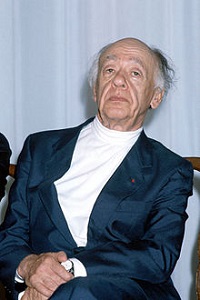
Eugène Ionesco (26 november 1912 – 28 maart 1994)
De Amerikaanse schrijfster Marilynne Robinson werd geboren in Sandpoint, Idaho op 26 november 1943. Zie ook alle tags voor Marilynne Robonson op dit blog.
Uit:Gilead
„In his old age my grandfather lived with us here in Gilead. Then he ran off to Kansas, where he died. When he left us we all felt his absence bitterly, though he did make things difficult. It was an innocence in him. He lacked patience for anything but the plainest interpretations of the starkest commandments, “To him who asks, give,” in particular. He never kept anything that was worth giving away, or let us keep it, either. He would take laundry right off the line. My mother said he was worse than any thief, worse than a house fire. She said she could probably go to any town in the Middle West and see some pair of pants she’d patched walking by in the street. And we were not the only ones he plundered. My mother said you could tell where a Congregationalist lived by the padlock on the shed door. I believe he was a saint of some kind, in his old age. When someone remarked in his hearing that he had lost an eye in the Civil War, he said, “I prefer to remember that I have kept one.” My mother said it was good to know there was anything he could keep.
I describe my grandfather as if he were simply an eccentric, and as if we tolerated him and were respectful of him and loved him, and he loved us. And that is true. But I believe we knew also that his eccentricities were thwarted passion, that he was full of anger, at us not least, and that the tremors of his old age were in some part the tremors of pent grief. He had lived so many years in a rage and an ecstasy of hope, intent on freeing the captive, proclaiming liberty. He told me once about a vision he had when he was still a boy in Maine, sometime in the eighteen-thirties. He had fallen asleep by the fire, worn out from a day helping his father pull stumps. Someone touched him on the shoulder, and when he looked up, there was the Lord, holding out His arms to him, which were bound in chains. My grandfather said, “Those irons had rankled right down to His bones.” He told me that as the saddest fact, and eyed me with the one seraph eye he had, the old grief fresh in it. He was not yet sixteen, but he said he knew then that he had to come to Kansas and make himself useful to the cause of abolition. (To be useful was the best thing the old men ever hoped for themselves, and to be aimless was their worst fear. I have a lot of respect for that view.) When I spoke to my father about the vision he had described to me, my father just nodded and said, “It was the times.” He himself never claimed any such experience, and he seemed to want to assure me I need not fear that the Lord would come to me with His sorrows. And I took comfort in the assurance. That is a remarkable thing to consider."
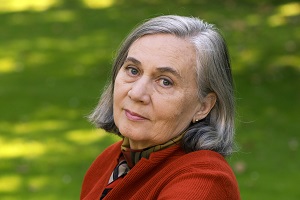
Marilynne Robinson (Sandpoint, 26 november 1943)
De Vlaamse dichter en schrijver Louis Verbeeck werd geboren in Tessenderlo op 26 november 1932. Zie ook alle tags voor Louis Verbeeck op dit blog.
Zaterdag
't Is goed je eigen hemd te strijken,
nog even voor het slapengaan,
en dan zorgvuldig na te kijken:
staan al mijn knoopjes er nog aan?
En staan ze, ook aan de manchetten,
zo vast als 't past voor je fatsoen,
dan kan niets meer je nog beletten
gerust je ogen toe te doen.
Toch wat lente
Je krijgt de mooiste zonsopgang
Die je maar kunt verzinnen
Je moet me dan wel levenslang
Heel intensief beminnen.
Een melkweg krijg je ook cadeau
- daar moet ik nog voor sparen -
Maar tegen kerst, nieuwjaar of zo
Zal ik die klus wel klaren.
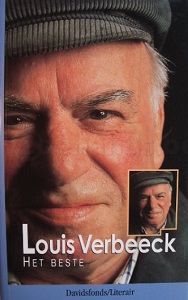
Louis Verbeeck (Tessenderlo, 26 november 1932)
Cover
De Hongaarse dichter, schrijver en vertaler Mihály Babits werd geboren op 26 november 1883 in Szekszárd. Zie ook alle tags voor Mihály Babits op dit blog.
Zigeuner Im Armsünderhaus
Einst formte ich das Gedicht mit den Fingern
meiner Hand,
wie der Herr vielleicht einen glänzend
beflügelten, gepanzerten Gliederkäfer
erfand.
Später formten es meine Lippen,
wie der Soldaten
durstige, schrundige Lippen
den Trompetenton,
den Trompetenton gefunden hatten.
Doch heute tauchen die Verse so zaghaft
auf,
so verschwommen,
wie aus den eingefallenen Augen
verschämt und zögernd
Tränen kommen.
Ich wein nicht um mich, ich hab Millionen
Brüder.
Arm sind sie, so arm! Nicht einmal in ihren
Träumen
spiegelt sich irgendwo Gutes wider.
Sie hätten gern eine Hütte im Wald, doch
das Holz
ist gesperrt. Sie sind schon auf ein
Kästchen in einem
großen, düsteren städtischen Kasten stolz.
Und sie freun sich, daß sie - wenn ihnen
alles mißglückt -
sich aus des Stockwerks Fenster stürzen
können
und ihre gute Mutter, die Erde, sie an sich
drückt.
Eine traurige Welt! Und so zaghaft singt
das Gedicht
wie der Zigeuner im Armsünderhaus.
- Husch, husch -
all ihr zuckenden, summenden,
glänzenden Käfer fort
aus dem Licht!
Was ist der Trompetenstoß wert, wenn er
nicht Wunder tut,
nicht Tote erweckt? Nur die Träne, die
Träne fällt,
und sie fragt nicht, wozu ist sie gut.
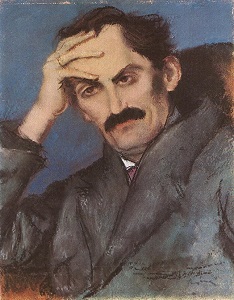
Mihály Babits (26 november 1883 - 4 augustus 1941)
Portret door József Rippl-Rónai, 1923
Zie voor nog meer schrijvers van de 26e november ook mijn vorige blog van vandaag.
|



